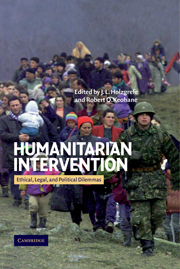Book contents
- Frontmatter
- Contents
- List of contributions
- Acknowledgments
- Introduction
- PART I The context for humanitarian intervention
- 1 The humanitarian intervention debate
- 2 Humanitarian intervention before and after 9/11: legality and legitimacy
- PART II The ethics of humanitarian intervention
- PART III Law and humanitarian intervention
- PART IV The politics of humanitarian intervention
- Select English language bibliography
- Index
2 - Humanitarian intervention before and after 9/11: legality and legitimacy
Published online by Cambridge University Press: 27 July 2009
- Frontmatter
- Contents
- List of contributions
- Acknowledgments
- Introduction
- PART I The context for humanitarian intervention
- 1 The humanitarian intervention debate
- 2 Humanitarian intervention before and after 9/11: legality and legitimacy
- PART II The ethics of humanitarian intervention
- PART III Law and humanitarian intervention
- PART IV The politics of humanitarian intervention
- Select English language bibliography
- Index
Summary
Introduction: why the fuss?
On the eve of the 11 September (hereafter “9/11”) terrorist attacks on New York and Washington, articles, monographs, anthologies, conferences, and symposia on “Humanitarian Intervention” were proliferating even faster than weapons of mass destruction. This metastasis of policy-focused cerebration coincided curiously with the paucity of the thing itself. Not, to be sure, of the exquisite suffering that was its notional target. Central Africa remained, as it remains today, in search of a contemporary Hieronymus Bosch to record its quotidian triumphs of death. The elites of northern Sudan had not ceased their efforts, marked by a fine lack of discrimination, to subordinate, mutilate, or murder the Christians and Animists of the south. In Afghanistan, an entire gender was held in close captivity, and deviance by either sex from eighth-century views of the proper limits of human agency summoned eighth-century sanctions.
Suddenly experiencing the pre-9/11 frenzy of debate about the legality, legitimacy, and appropriate occasions and instruments for humanitarian intervention, a stranger to our planet might fairly have concluded that every Western government with the means to project force beyond its frontiers, above all the United States Government, was straining against the leash woven out of normative uncertainties, awaiting only their resolution to hurl itself into the humanitarian fray. But if he had taken brief leave of the conference circuit to note the multiple hesitations and evasions of the Clinton Administration, or to parse the self-constraining declarations of President George W. Bush and his colleagues and the doctrinal pronouncements of the American military establishment, or to survey the extent of essential preparation, whether in the United States or the United Nations, he would doubtless have arrived at a quite different view of the matter.
- Type
- Chapter
- Information
- Humanitarian InterventionEthical, Legal and Political Dilemmas, pp. 53 - 90Publisher: Cambridge University PressPrint publication year: 2003
- 31
- Cited by



